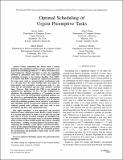Optimal Scheduling of Urgent Preemptive Tasks
Author(s)
Andrei, Stefan; Cheng, Albert; Rinard, Martin C.
DownloadRinard_Optimal scheduling.pdf (355.1Kb)
PUBLISHER_POLICY
Publisher Policy
Article is made available in accordance with the publisher's policy and may be subject to US copyright law. Please refer to the publisher's site for terms of use.
Terms of use
Metadata
Show full item recordAbstract
Tasks' scheduling has always been a central problem in the embedded real-time systems community. As in general the scheduling problem is NP-hard, researchers have been looking for efficient heuristics to solve the scheduling problem in polynomial time. One of the most important scheduling strategies is the Earliest Deadline First (EDF). It is known that EDF is optimal for uniprocessor platforms for many cases, such as: non-preemptive synchronous tasks(i.e., all tasks have the same starting time and cannot be interrupted), and preemptive asynchronous tasks (i.e., the tasks may be interrupted and may have arbitrary starting time). However, Mok showed that EDF is not optimal in multiprocessor platforms. In fact, for the multiprocessor platforms, the scheduling problem is NP-complete in most of the cases where the corresponding scheduling problem can be solved by a polynomial-time algorithm for uniprocessor platforms. Coffman and Graham identified a class of tasks for which the scheduling problem can be solved by a polynomial time algorithm, that is, two-processor platform, no resources, arbitrary partial order relations, and every task is nonpreemptive and has a unit computation time. Our paper introduces a new non-trivial and practical subclass of tasks, called urgent tasks. Briefly, a task is urgent if it is executed right after it is ready or it can only wait one unit time after it is ready. Practical examples of embedded real time systems dealing with urgent tasks are all modern building alarm systems, as these include urgent tasks such as `checking for intruders', `sending a warning signal to the security office',`informing the building's owner about a potential intrusion', and so on. By using propositional logic, we prove a new result in schedulability theory, namely that the scheduling problem for asynchronous and preemptive urgent tasks can be solved in polynomial time.
Date issued
2010-09Department
Massachusetts Institute of Technology. Department of Electrical Engineering and Computer ScienceJournal
Proceedings of the IEEE 16th International Conference on Embedded and Real-Time Computing Systems and Applications (RTCSA 2010)
Publisher
Institute of Electrical and Electronics Engineers
Citation
Andrei, S. et al. “Optimal Scheduling of Urgent Preemptive Tasks.” Embedded and Real-Time Computing Systems and Applications (RTCSA), 2010 IEEE 16th International Conference On. 2010. 377-386. © Copyright 2010 IEEE
Version: Final published version
ISBN
978-1-4244-8480-5
ISSN
1533-2306